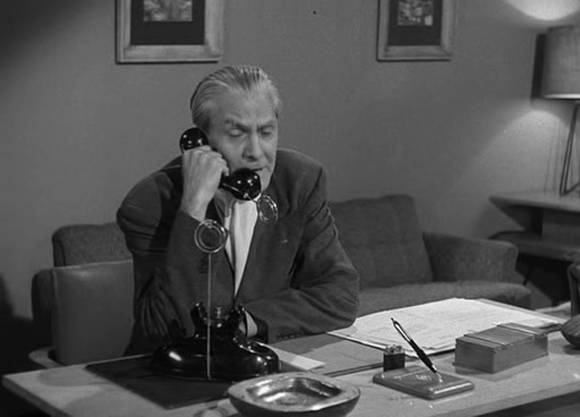wireless

These days the telephone turns 150 … if, without any reservations whatsoever, you accept ↑Johann Philipp Reis (1834-1874) as its inventor. German media during the last weeks were inclined to accept it that way, naturally. Alas, a short glimpse on the ↑timeline of the telephone teaches us that we can not anymore write histories of technology by constructing absolute origins and godlike inventor personalities. Nevertheless does it seem above dispute that Reis coined the term “telephone.”
Be all that as it may, I take the ample opportunity to have a look on how the future of the telephone was envisioned nearly 60 years ago [that is, I want to show off a screenshot I recently took].
The above is a screengrab taken from the movie “Project Moon Base” (Talmadge 1953). We see Dr. Wernher (Larry Johns) on the wireless phone, talking to the brass responsible for a rocket expedition—first to a space station orbiting the Earth, and then on, around the Moon. The General on the other end tells Dr. Wernher that an official car will pick him up from his hotel and shuttle him to the launching facilities, where Wernher will board the spaceship.
Ain’t that wonderful? They just took an off-the-shelf telephone of the period, ripped out the cord connecting the receiver with the base station, and substituted it with mock antennas.
But the fine gadgetry doesn’t help the good doctor a bit, as immediately after the phone conversation he is abducted by the agents of an opposing nation, and substituted with a lookalike operative. From then on the drama unfolds. Wikipedia knows on “↑Project Moon Base [that’s the way it is spelled in the opening titles]:”
The film is unusual for its time in both attempting to portray space-travel in a “realistic” manner, and for depicting a future in which women hold positions of authority and responsibility equal to men; in the script the president of the United States is a woman.
The screenplay is by legendary sci-fi author ↑Robert Heinlein. The female president of the United States is not only in the script, but to be seen towards the end of the movie. The other woman in a responsible position is Colonel Briteis (Donna Martell), spaceship pilot and commander.


Wernher (von Braun?)
In the movie and its credits the character simply is called “Dr. Wernher,” like Wernher was his family name. But of course they are alluding to Wernher von Braun. The latter was in the US since late September 1945. By 1950 he was a well-known public figure, a celebrity you could say. Around the same time he voiced visions of man flying to space, colonizing the moon and such, which were printed by major newspapers. This in turn inspired the movie industry.